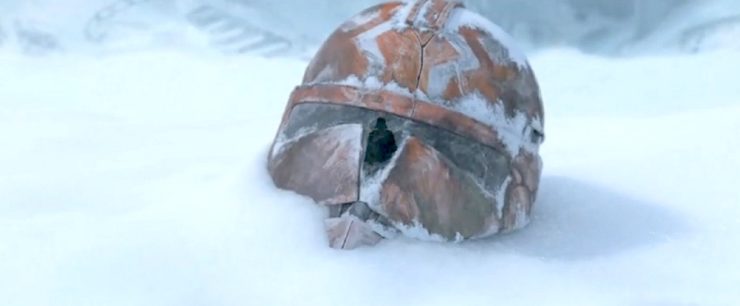After years of hiatus, we finally got the ending that The Clone Wars deserved. It’s been a rough ride in those last several episodes, moving through the parts of the story that match up with Revenge of the Sith. But it’s a fitting end to a show that has always been about one thing above all others: Making the Star Wars prequels make sense.
[Spoiler for the series finale of Star Wars: The Clone Wars]
While the events of the finale arc were alluded to in flashback in E. K. Johnston’s novel Ahsoka, The Clone Wars takes the time to show (and vaguely retcon) these events, bringing the story to a close as the final chapter of the Star Wars prequels ends. What we get is a far more emotional punch than Episodes I-III were capable of delivering on because we have more story backing it up—which was always the goal of The Clone Wars as a series, offering context to a trilogy of films that gave utterly no supportive reasoning as to why anything was happening.
When Order 66 is executed in Revenge of the Sith, it’s sad because we’re told the Jedi are good guys, and we see them die all at once. The closest the film comes to driving that emotional resonance home is seeing Yoda nearly collapse under the pain of all that death hitting him at once. Outside of that, we’re removed, and the choice seems almost deliberate—we need to stick with Anakin Skywalker despite what he’s done, for the rest of the film. If we’re too attached, we might not want to finish the journey with him.
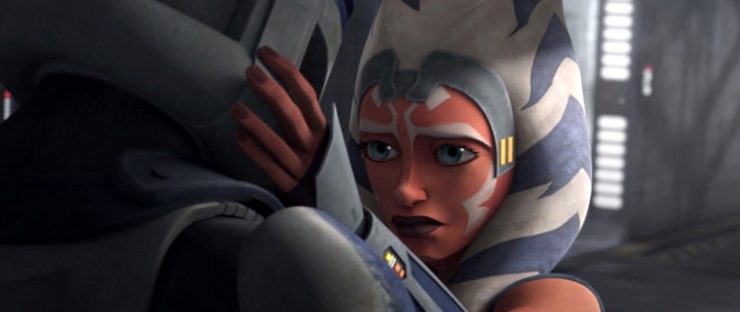
The Clone Wars has the upper hand where this is concerned because, at its heart, it has always been a story about Ahsoka Tano.
Buy the Book
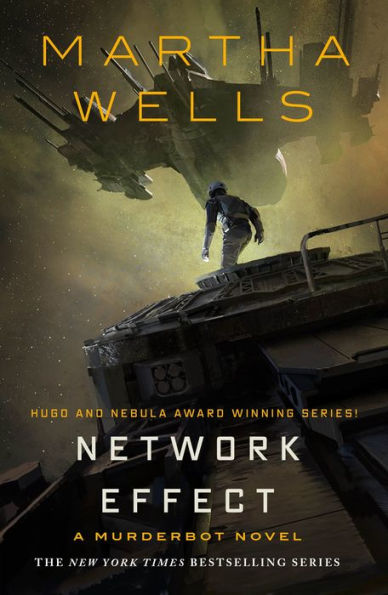

Network Effect
One of the greatest retcons in Star Wars history, the creation of Ahsoka Tano and her subsequent development over multiple stories has been an immeasurable gift to the Star Wars universe. The audience was allowed to watch Ahsoka grow up in realtime at the start, and seeing her morph from an (understandably) irritating teen into one of the greatest Force-wielders the galaxy has ever known has been an all-time highlight of the entire saga thus far. Being with her during the issuing of Order 66 was the only way to humanize these events and highlight the true cost of what Palpatine did. Not just to the Jedi, or even to the galaxy at large, but to the disposable army he created to fight and die for the Republic, the ones he used as his own personal squad of executioners.
With that in mind, we can only view the end of The Clone Wars as precisely what it leaves to us—a correction of everything that didn’t land as it needed to in Revenge of the Sith.
Think about it: This four-part finale begins with Anakin Skywalker grandstanding on a battlefield, there to aid his mentor and best friend Obi-Wan Kenobi. It has all the hallmarks of the opening of Episode III, but with a marked difference—we can see clearly that Anakin is thriving in this wartime environment, has grown accustomed to it. Obi-Wan, on the other hand, is exhausted and ready for all of it to be over. His seemingly endless well of sarcasm comes close to running dry. He can’t keep up the facade any longer, the fight is leaving him. This is a large part of why he will lose Anakin in the end; Obi-Wan has nothing left to give. He may handle himself with enough finesse to convince everyone else otherwise, but he’s running on fumes, and no one is available to pick up the slack.
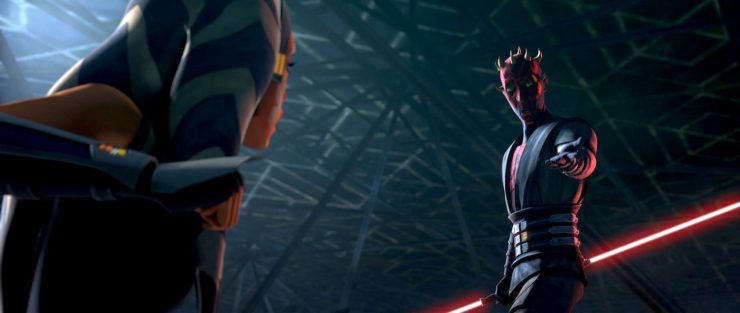
The failures of the Jedi are abundantly clear in these episodes. Mace Windu dismisses Ahsoka outright, refusing to let her in on their plans because she’s left the Order. Both Yoda and Obi-Wan know that Ahsoka wants to tell Anakin something, and they want her to speak with him, knowing that she is one of the only people who could possibly get through to him as things fall apart. But Ahsoka isn’t willing to do their dirty work for them, and for good reason; she no longer trusts the Jedi Order herself—that’s why she left. The Jedi lost their greatest asset in preventing Anakin’s fall to the Dark Side the moment they alienated Ahsoka Tano. We can see all the cracks in their reasoning, and how it’s going to destroy them. It’s hard to feel bad for the Jedi when the hubris is so perfectly displayed to us.
Instead of a faceless army, we have clone troopers that we’ve spent seasons alongside, particularly Rex. The troops lent to Ahsoka for the Siege of Mandalore are only permitted because of some crafty finagling on Anakin’s part to give his former pupil the resources she needs, and the clones honor her by painting their helmets to look like her facial markings. This means that when Order 66 comes through many of the clones facing Ahsoka down, trying to kill her, are wearing her mark. Between that and Rex’s visible struggle not to hurt her, we’re reminded that the clones are people, not photocopied cogs in a massive machine. And even then, Ahsoka goes one better—throughout their fight on the carrier, as the ship is crashing into a moon, she’s trying her hardest not to hurt them. She tells Rex that they are not responsible for what was programmed into them in childhood, and refuses to mow these men down indiscriminately. And when they’re gone, she and Rex bury them with all the dignity they are owed.
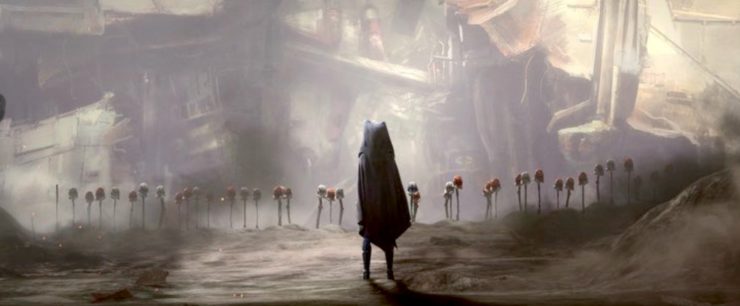
Instead of a flimsy one-and-done second tier villain, this finale gives us Darth Maul, who (due to his revival in the Clone Wars series) has all the gravitas of a good Shakespearean tragic hero. Revenge of the Sith makes the mistake of dispatching Count Dooku before he can do anything interesting, and then we’re stuck with General Grievous, who doesn’t really add much by way of dramatic tension. He’s just got a bunch of arms and some experience menacing people. With Maul we again have added history, but more importantly, we have someone who can actually piece together what is happening as the Emperor makes his play. Maul knows parts of the plan, and actually wants to stop it—but no one is listening. His efforts to bring Ahsoka over to his side are more unnerving for the fact that he has a decent argument in his favor… and for the fact that the only reason Ahsoka hesitates is because she believes Maul is wrong about Anakin’s destiny.
When he isn’t.
But perhaps most important of all, the final frames of The Clone Wars are haunting in a way that the prequels could never manage. Instead of Vader coming to life like Frankenstein’s monster, crying “Nooooo” into the echoing darkness, we see the Sith Lord emerge into silence on a plain of snow. There are troopers and droids milling around, but they don’t seem to take note of him. He finds the graveyard of clones that Ahsoka and Rex left behind. He locates one of Ahsoka’s lightsabers, half of the set that he fixed up and returned to her out of love. He looks up into the sky. He says nothing, and no one speaks to him.

We don’t know what Vader is feeling. We can’t. That is the real tragedy of being Darth Vader—anonymity of emotion, of pain, of thought, unto the end. The Clone Wars brings that across effortlessly in mere moments of screen time. It hurts because it’s supposed to hurt. It stings even more because we don’t get to see what happened to Anakin. We know, but we don’t witness it. He’s just gone, and this monstrous spectre has taken his place.
Forever.
This is what Episode III was supposed to feel like, every step of the way. We had to wait fifteen years to get something with the resonance we deserved, but at least it all came out in the wash. The rise of the Empire finally feels like the devastating loss it was always meant to evoke, and the arrival of Darth Vader heralds nothing but emptiness. We finally watch Vader walk away, and those helmets painted to look like his former Padawan’s visage take on a new meaning; he is reflected in the visor, growing ever smaller while some semblance of Ahsoka’s face—and a symbol of that terrible war—watches him go.
The Clone Wars understood the tragedy of its premise better than practically any other piece of Star Wars media ever has. It knew exactly where it was headed and how to communicate that end with maximum operatic effect. But more importantly, the show understood that Star Wars is primarily a lesson in visual storytelling. That was George Lucas’s forte, an aspect that The Clone Wars elevated with every season it was on the air. The soundtrack provides the atmosphere, the scripts provide detail and texture, but when Star Wars is done right—all it takes is a frame.
It’s going to be hard to let go of one of the greatest Star Wars stories ever told.
Emmet Asher-Perrin is going to rewatch that four-part finale over again because they’re not quite ready for it to be over. You can bug them on Twitter, and read more of their work here and elsewhere.










